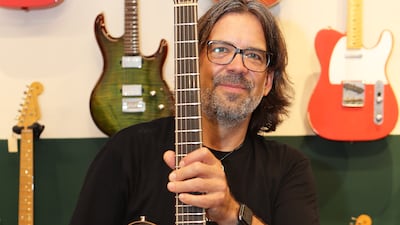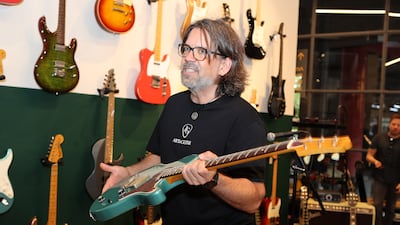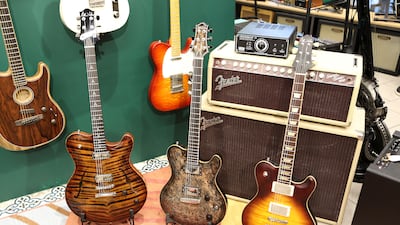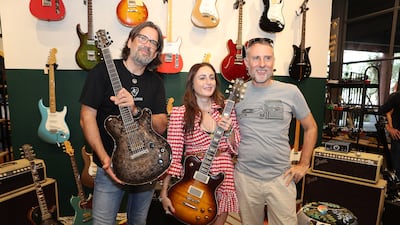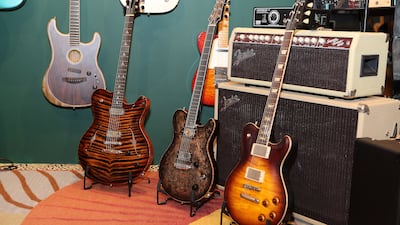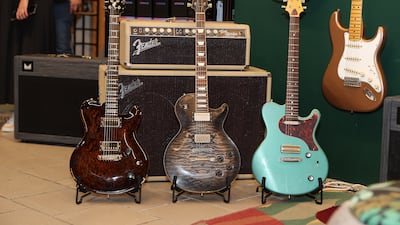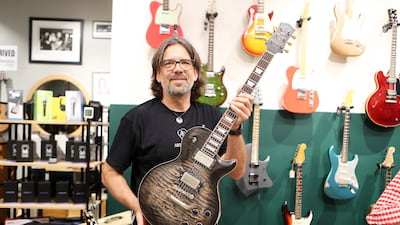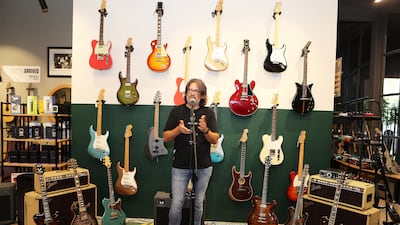When it comes to electric guitars, there are quite a few variables to making a resonant and responsive instrument.
The type of wood used, the thickness of the body, the scale length of the neck, the fret wire and even the type of finish used all contribute to its tonality.
Artisans therefore go to great lengths to choose the individual parts to make expressive, unique guitars. Even in mass-produced models, there are slight differences between two guitars made in the same batch. Each will have its own soul.
Few people are in tune with the nuances of this craft as Nik Huber, founder of Nik Huber Guitars, a boutique company that recently arrived in the Middle East for the first time. His creations are on sale at Dubai’s Art of Guitar store.
His instruments are not cheap, costing up to Dh70,000 for a collector-worthy prototype model. However, between the premium tone woods, hand-wound electronics, meticulous craftsmanship and arresting aesthetics, they are among the best money can buy.
Huber's guitars have also received more than a handful of stellar endorsements, ringing out through studios and stadiums thanks to Foo Fighters, Snarky Puppy, Robbie Williams, Justin Bieber and Prince.
While Huber’s aptitude for making guitars took years of experimentation, as well as insights from another globally esteemed guitar maker, his passion and know-how of wood has run in the family for generations.
Huber comes from a long line of woodworkers. His timbered lineage can be traced back to 1896, to his ancestor Nikolaus. Huber is the fourth person in his family to carry the name Nikolaus.
And much like the name has been passed down across the decades, so has this magnetism towards woodworking. Huber’s grandfather was a cabinet maker in their native Bavaria. His father, a pilot, was also a craftsman and made Huber his first custom-built electric guitar when he was a teenager.

"My father, in his younger years, was also a cabinet maker and about to take over the business," he tells The National. "But then he went to the military, became a jet pilot and then went to [German airline] Lufthansa.
"But some of our neighbours didn’t know he was a pilot because he was always wearing these woodworker’s clothes and had a shop in his basement."
Huber initially sought to become a professional musician, but as his aspirations lost steam, he found work in a cabinet-making company in Germany. His father, meanwhile, retired from his role as a pilot and enrolled in a three-week guitar-building course in Spain.
“He came back with a guitar that really blew my mind,” Huber says. He soon followed in his father’s steps to Spain.
“The experience was completely mind-changing,” he says, adding that he realised “this is what I want to do".
In the early 1990s, Huber attended the same guitar-making course his father did. In 1994, he finally had the opportunity to show one of his creations to one of the most established luthiers in the guitar world: Paul Reed Smith, founder of PRS Guitars.
However, Smith was not impressed at first.

“He looked at the guitar and asked me: ‘What do you want to do with this guitar?’ I told him I want to be a guitar maker," he says. "He asked me whether I wanted honest feedback, then he said: ‘You’re not good enough. You have to improve’," Huber recalls.
Smith offered to help Huber develop his craft and offered him his fax number in case he had any questions.
“I didn’t really expect answers but a day or two later, the fax machine crackled and he answered," he adds. "He only gave me direction and let me work into what he was guiding me towards. He never gave me the recipe.”
In 1996, Huber took his creations public and he established Nik Huber Guitars. While the company has steadily grown over the years, it remains an intimate affair, with a dozen skilled luthiers handmaking no more than 400 guitars a year.
A number of Huber’s guitars, including the Krautster and the Orca, are reminiscent of certain vintage guitars, but even so, he always adds his own touch to them.

His neck carves are on the beefier side, paying homage to the now-rare cuts from the prized models of the mid-20th century. “I also think a bigger neck supplies a bigger tone,” he says. “As long as you have a good, resonating wood.”
However, that’s not to say he doesn’t take to mind other guitar player’s preferences, a good portion of whom prefer a slinkier 24.75-inch (62.8cm) scale or a slimmer neck carve. In fact, he has recently released his first medium-scale neck guitar in Dubai, a fresh-take prototype of his idiosyncratic Dolphin model. The guitar, signed by Huber, is dubbed the Dolphin `59 Prototype No 1, and has an asking price of Dh69,900.
Many of the first Huber guitars to make their way to Dubai have already been sold, fetching between Dh23,900 to Dh55,000.
The arrival of his brand at Art of Guitar presents an interesting milestone for the local guitar market. Until a decade ago, there was a noticeable absence of music shops that offered any boutique or vintage models. In the two years since its opening, Art of Guitar has demonstrated there is a considerable demand for high-end guitars, particularly with the speed with which its offerings change.
“Anybody can carry one of the top two, three brands,” Nisreen Shocair, co-founder of Art of Guitar, says, adding that the store is perhaps more keen on offering “very niche guitar brands".
“Nik Huber is one of the few who did not turn the creation of guitars into a factory business," she says.
“We had a waiting list when people found out that his guitars were coming to Dubai. That’s the guitar world. If we gave them the airwaybill number [used to track parcels], I think we would have found them at the airport.”
Shocair says selling a high-end guitar is not merely about getting it out of the showroom, but rather ensuring its proper playability and future maintenance.
“You need the full ecosystem,” she says. “You can’t just be a store in the mall that just sells things but doesn't fix them. We need people to hold on to the things they buy.”
